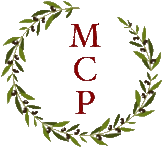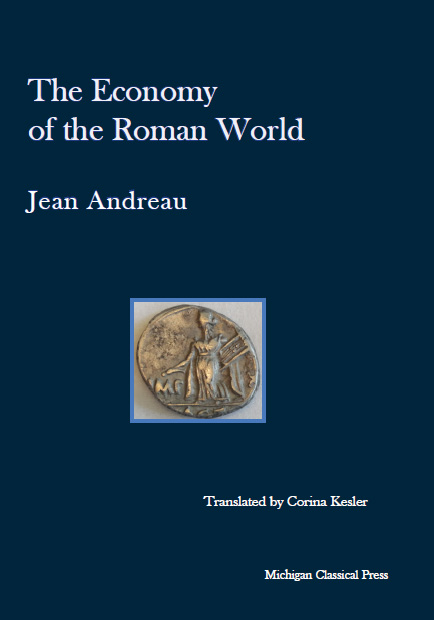Catalog: Book Details
Born about 200 BC in Greece to a politically prominent family, Polybius had his own political career cut short when he was deported to Rome as a hostage. During his exile, he commenced the composition of his Histories, with the original goal of examining Rome's rise to supremacy during the years from 220 to 168 BC; later he would extend his investigation down to the aftermath of the Third Punic and Achaean wars, which ended in 146 BC.
Of the original forty books of the Histories, today only the first five survive essentially intact, with most of the remaining books represented by fragments of various lengths. In this volume, David D. Phillips presents a commentary on Polybius' first book. The volume includes the definitive text by Theodor Büttner-Wobst, together with detailed commentary on points of linguistic and historical interest, and an introduction to Polybius' life, the Histories (with special attention to book 1), and Polybian language, style, and tone.
David D. Phillips is Professor of History, University of California, Los Angeles. He is the author of The Laws of Ancient Athens (University of Michigan Press, 2013), Avengers of Blood: Homicide in Athenian Law and Custom from Draco to Demosthenes (Franz Steiner Verlag, 2008), and Athenian Political Oratory: 16 Key Speeches (Routledge, 2004).
ISBN 978-0-9799713-7-2; 6x9; 269 pages, $65 (cloth)
The Economy in the Roman World
The Economy of the Roman World examines the economic history of Rome in the Republican and Imperial periods. It considers evidence from archaeological and literary sources, and it offers an updated and modern economic analysis after examining popular economic theories of previous years, including but not limited to those of M.I. Finley and M.I. Rostovtzeff.
Jean Andreau offers translations of relevant ancient economic and literary texts, and he considers what these passages show us about farming and agriculture, manufacturing, shipping, and particularly the role of slaves in the Roman economy.
This first edition in English, translated by Corina Kesler, offers an updated bibliography, with attention to works more easily located in an Anglophone context.
Jean Andreau's comprehensive and synthetic study of the Roman economy has new ideas and new arguments that will interest scholars, while his clear method of presentation will be useful in a classroom setting and for those new to ancient economic study.
Jean Andreau is Director d'études, L'École des Hautes Études en Sciences Sociales (EHESS), Paris.
ISBN 978-0-9799713-5-8; 6x9; 171 pages, $50.00 (cloth)
Thucydidean Narrative & Discourse
Mabel Lang
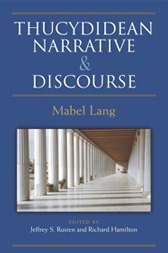
Mabel Lang's distinguished contributions to Bronze Age and Classical archaeology were matched by sensitive and original studies of Greek historical writing. This volume, edited by Jeffrey S. Rusten and Richard Hamilton, collects her articles on Thucydides and adds substantial previously unpublished material on Thucydidean thought-patterns, adaptations of Herodotean structure, and the importance of indirect speeches in his history.
Together with introductory and biographical essays by Jeffrey Rusten and Eleanor Dickey, and Miss Lang's distinguished longtime colleague Mary Patterson McPherson, these papers will enable students of historiography in general to obtain a better understanding of how Thucydides engaged his audience.
Jeffrey S. Rusten is Professor of Classics at Cornell University. Richard Hamilton is Paul Shorey Professor Emeritus of Greek at Bryn Mawr College.
ISBN-13: 978-0-9799713-4-1; 6x9, 219 pages, $65.00 (cloth)
Keywords: Thucydides, Herodotus, Greek history, Mabel Lang, Jeffrey Rusten, Richard Hamilton, Mary Pat McPherson, Michigan Classical Press
Review attention for Thucydidean Narrative and Discourse
"[T]his collection of Lang's writings should complement any bookshelf devoted to Thucydides or to narratological approaches to ancient literature." - Bryn Mawr Classical Review
"Very engaging and thought-provoking..." - The Classical Outlook
Sappho's Gift: The Poet and Her Community
Franco Ferrari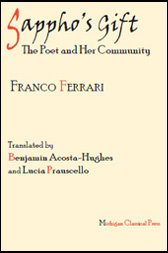
This latest volume from accomplished literary critic Franco Ferrari offers extraordinary new insight into the life and works of Sappho, one of the most individualistic and evocative poets of antiquity.
Sappho's Gift: The Poet and Her Community presents the fragmentary papyrological evidence about the poems, and considers Sappho's iconography, the types of poems and their occasions, her audience, and milieu.
Important for those new to Sappho, this volume also offers fresh readings that will be of interest to scholars who are well familiar with the poems.
Benjamin Acosta-Hughes is Professor of Greek at The Ohio State University. Lucia Prauscello is Lecturer in Classics at the University of Cambridge and Fellow of Trinity Hall.
ISBN-13: 978-0-9799713-3-4; 6x9, 228 pages, five halftones, subject and source indices, $62.00 (cloth)
Keywords: Sappho, Greek lyric poetry, Greek literature, Franco Ferrari, Lucia Prauscello, Benjamin Acosta-Hughes, Michigan Classical Press
Review attention for Sappho's Gift: The Poet and Her Community
"Ferrari certainly meets the goal set in his preface; the range of readings and suggestions found in this book is truly impressive... recommended reading for all students of Greek lyric poetry." - Bryn Mawr Classical Review
The Well-Read Muse: Present and Past in Callimachus and the Hellenistic Poets
Peter Bing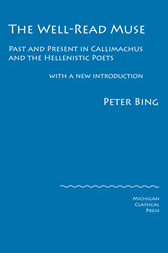
"Tradition and originality, the interplay of present and past, are a concern of poets in any age." Peter Bing's seminal monograph, The Well-Read Muse: Present and Past in Callimachus and the Hellenistic Poets, chases this idea through the thickets of Hellenistic poetry and particularly among the lines of Callimachus' Hymn to Delos.
In this carefully argued and stimulating study, the author investigates the era in which the written work - the book - superseded the assumption of oral composition and performance. In this and in other respects, as this study demonstrates, Hellenistic poets saw themselves as now being part of a new world, remote from the great genres and achievements of the earlier literary tradition. That sense of distance from the past gave authors freedom to experiment. At the same time, it incited them to view their poetic heritage as something deserving intense scholarly study. The author examines one fundamental result of this attitude, the Hellenistic tendency toward learned allusion, and what this meant to a period pursuing a different literary approach.
The Well-Read Muse concludes with an analysis of Callimachus' Hymn to Delos as a paradigmatic instance of the play between present and past, tradition and originality that typified the age. Here the author sheds important light on the poet's choice not to make Apollo his theme, as his models had, but to focus rather on the diminutive, slender island, through which the god of song was born.
Accompanied by a new Introduction by the author and corrections to the text and notes, as well as by an extensive bibliography and indices of passages and subjects discussed, The Well-Read Muse provides an important understanding of this turning point in Greek poetical development. There was no escaping the new world of which these poets were a part: Peter Bing's impressive work examines the ways in which poets confronted this new reality.
Peter Bing is Professor of Classics at Emory University, and Chair of his department. He is well known for his work on Hellenistic poetry, his translations of Greek and Roman erotic poetry, and also of books on Greek religion. He has been a fellow of the Center for Hellenic Studies, the Alexander von Humboldt Stiftung at the University of Tubingen, Clare Hall at the University of Cambridge, and holder of the Tytus Fellowship at the University of Cincinnati.
ISBN 978-0-9799713-0-3; 6x9, 163 + x pp., $45 (cloth)
Keywords: Callimachus, Hellenistic poetry, Greek literature, Hymn to Delos, Peter Bing, Michigan Classical Press
Generic Composition in Greek and Roman Poetry
Francis Cairns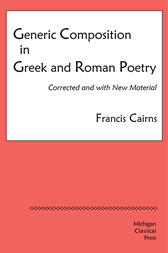
Original in conception and powerful in scope, Generic Composition in Greek and Roman Poetry remains one of the most important books on early Greek, Hellenistic, and Roman poetry in a generation. First published in the philological climate of the early 1970s, Francis Cairns' book was among the first works that sought to further our comprehension of difficult or obscure ancient poems by applying new literary-critical conventions and terminology, notably the concept of genre. Ancient literary studies have grown more sophisticated over the last years, and Generic Composition in Greek and Roman Poetry now finds itself very much in the midst of current debates. The new edition includes a new Postscript by the author, and important corrections to the text, notes, and indices.
The original publisher remarked, "This is the first serious attempt to formulate a system of literary criticism for ancient poetry, derived wholly from ancient evidence. It is based on methods of generic analysis, assignment and interpretation applicable to all Greek and Roman poetry. It outlines what the author deduces are the creative principles informing ancient poets' approach to their subject matter, and establishes criteria that enable an objective discussion of the poems' originality and merit."
Generic Composition in Greek and Roman Poetry examines uses of topoi and categories of genres, and offers detailed and insightful interpretations of many individual poems in both languages. It also highlights five specific generic sophistications, among them inversion and inclusion. The work is accompanied by extensive notes and indices, together with translations of the original texts that make it accessible and valuable to classicists and non-classicists alike.
One of the great contributions of Francis Cairns' work has been firmly to move the study of ancient poetry away from the realm of fictive literary biography, while grounding critical analysis in the techniques that were employed by ancient authors to create meaning.
Francis Cairns is Professor of Classical Languages at The Florida State University. He has written numerous articles and books on Greek and Latin literature, including Propertius: The Augustan Elegist, Virgil's Augustan Epic and Tibullus: A Hellenistic Poet at Rome. He is editor of PLLS.
ISBN 978-0-9799713-1-0; 6x9; 336+ iv pp., $65 (cloth)
Keywords: Greek genre, Latin genre, lyric poetry, topoi, Francis Cairns, Michigan Classical Press
Praise for Generic Composition in Greek and Roman Poetry:
"Despite the general similarity between the first and second edition, the appearance of the latter is to be welcomed not least as one of the maiden publications of the newly formed imprint. According to their press statement MCP is a private press based in Ann Arbor with an editorial board composed of senior faculty at the University of Michigan 'undertaking to publish important scholarly research in the fields of classical antiquity, classical philology, and ancient history.' Until now the production consists of three second editions (including Generic Composition) and an English translation of Franco Ferrari's Sappho's Gift: The Poet and Her Community (Una mitra per Kleis: Saffo e il suo pubblico), and more new titles are planned for the future. The foundation of a new publishing venture for scholarly work, one which seems to have found a viable business model, at a time when so many presses are drastically limiting production is indeed heartening. The quality of the Generic Composition volume, which I have been thumbing over for a few too many months, is excellent; a well made hardback, nicely printed on sturdy, acid-free paper with a sewn binding at a lower price than is charged for many print-on-demand paperbacks, and proceeds from sales are in part contributed to charitable funds under the direction of the APA. What's not to love?"
The Roman Empire of Ammianus
John Matthews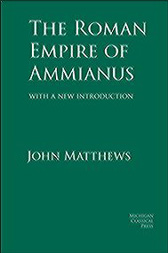
John Matthews' brilliant analysis of Ammianus and his world is foundational for the study of the Roman Empire in the fourth century CE. Matthews' Ammianus is a man very much in touch with his times, engaged in many of the exciting events that he describes, and a commentator motivated by a passionate devotion to justice.
The empire that he depicts in The Roman Empire of Ammianus is undergoing a profoundly important intellectual transition as Christians and non-Christians dealt with each other in new ways, and a profoundly important political transition as Rome's ability to control its frontiers was severely challenged.
This new edition of the volume offers a new Introduction by the author, and corrections to the original text. In Matthews' brilliantly researched and compellingly written pages we encounter brigands, philosophers, bishops, barbarians and one of the most extraordinary figures in all of Roman history: the Emperor Julian, who occupies for Matthews - as he did for Ammianus - a central place in the history of these times.
Ammianus has been recognized for centuries as the last great historian of the Classical Latin tradition. It is thanks to Matthews that we can at last begin to appreciate the brilliance and complexity of the tapestry he wove with his words.
John Matthews is John M. Schiff Professor of History and Classics at Yale University. He has written extensively on later Roman history, and he received the American Historical Association's James Henry Breasted Prize for The Journey of Theophanes: Travel, Business, and Daily Life in the Roman East.
His other works include Western Aristocracies and Imperial Court, AD 364-425; Political Life and Culture in Late Roman Society; Laying Down the Law: A Study of the Theodosian Code.
ISBN 978-0-9799713-2-7; 6x9; 608 + xiv pp., maps, $87 (cloth)
Keywords: Ammianus Marcellinus, Roman empire, Roman history, Roman historiography, John Matthews, Michigan Classical Press
Praise for the first edition of The Roman Empire of Ammianus:
"It is a book that can emphatically be read by the non-specialist... but can be digested at length by the specialist as well. Tacitus without the cattiness? Thucydides without the cynicism? Ammianus has no such vices, and the range and humane curiosity that make him a fit companion for a scholar like Matthews. They work well together." - Bryn Mawr Classical Review
